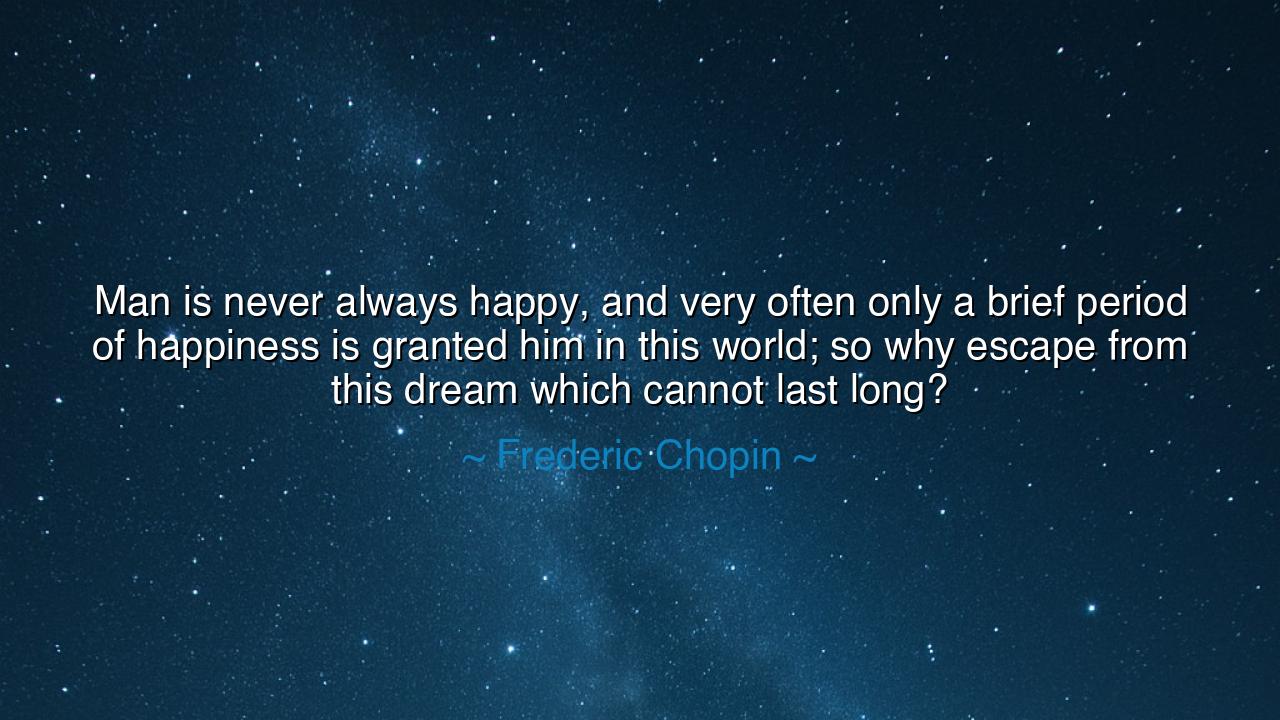
Man is never always happy, and very often only a brief period of
Man is never always happy, and very often only a brief period of happiness is granted him in this world; so why escape from this dream which cannot last long?






In the twilight of his short but luminous life, Frédéric Chopin, the poet of the piano, spoke these words of haunting beauty and wisdom: “Man is never always happy, and very often only a brief period of happiness is granted him in this world; so why escape from this dream which cannot last long?” These are not the musings of a man detached from sorrow, but the reflections of one who had looked deeply into the fleeting nature of joy, love, and existence. In this utterance, Chopin teaches us to embrace the transience of happiness, to cherish the delicate dream of life precisely because it is fragile, brief, and uncertain.
For Chopin, life itself is a dream, a passing melody in the great symphony of time. To wish to escape it—to turn away from its hardships, its disappointments, its imperfect joys—is to reject the very beauty of being alive. He reminds us that happiness, though fleeting, is no less precious because of its brevity. Indeed, its impermanence gives it power. Just as a single note can move the soul more deeply than a long and monotonous sound, so too do our short moments of joy give the heart its rhythm, its meaning, its grace. The wise do not lament that happiness passes—they give thanks that it ever came at all.
In these words, Chopin speaks not as a philosopher, but as an artist who lived on the edge of frailty. His own life was marked by illness, exile, and heartbreak. Yet through his suffering, he gave birth to music that still stirs the human soul. His nocturnes, his ballades, his tender preludes—all seem to echo this truth: that sorrow and beauty are not enemies, but companions. To escape the dream of life, even with all its pain, would be to silence the song before it has ended. For Chopin, to endure life’s impermanence is itself an act of courage and love.
History has seen many souls who shared this sacred understanding. Consider Marcus Aurelius, the Roman emperor and Stoic philosopher. Amid wars and loss, he wrote in his Meditations that all things are but fleeting shadows on the wind, and yet each moment, however small, holds infinite worth if lived with awareness. Like Chopin, he did not seek escape from life’s burdens but rather acceptance—the peace that comes from seeing the world as it is: brief, fragile, and luminous. Both men, though centuries apart, teach us the same truth—that the brevity of happiness should not drive us to despair, but to gratitude.
To say that man is never always happy is not to curse the human condition, but to reveal its profound texture. Constant happiness would dull the senses, numb the spirit, and drain life of meaning. Just as shadows define the shape of light, so too does sorrow give depth to joy. It is through contrast that we understand beauty. Chopin’s insight reminds us that the divine rhythm of existence lies in its alternation—pain and pleasure, despair and delight, silence and song. Without loss, there can be no appreciation; without endings, no beginnings.
Thus, Chopin’s question—“why escape from this dream which cannot last long?”—becomes both challenge and counsel. Why flee from the fleeting, when it is the fleeting that gives life its flavor? The dream of existence, with all its imperfections, is a miracle beyond measure. The wise do not wish it away; they savor its impermanence like a last note held in the air before silence. Every heartbeat, every tear, every fleeting smile is part of the melody that will one day fade—but not before it has touched eternity.
Let this be the lesson passed down through the ages: do not seek endless happiness, but presence. Do not curse the shortness of joy, but rejoice in its arrival. When the days are hard, remember that life itself is the most exquisite composition ever written—a blend of dissonance and harmony, struggle and peace. The melody will not last forever, but while it plays, let us listen with open hearts.
So, children of the earth, take to heart the wisdom of Frédéric Chopin: cherish your brief hours of sunlight, and do not run from the passing dream. For though happiness may visit but rarely, it leaves behind a fragrance that outlives its moment—and that, too, is a form of eternity.






AAdministratorAdministrator
Welcome, honored guests. Please leave a comment, we will respond soon